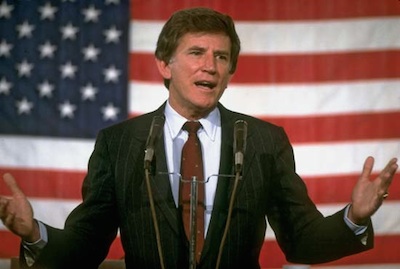
Former US Democrat presidential candidate Gary Hart is set to begin discussions next week with the Dublin and London governments in what is being seen as an attempt to again kick start peace talks in the Six Counties.
It was reported that the former US senator has been asked by US Secretary of State John Kerry to take an informal role in the peace process, replacing Richard Haass.
Last year, talks took place under the direction of the US diplomat and had been limited to discussions on three key issues: flags and symbols, sectarian parades, and the legacy of conflict. On New Year’s Eve, after six months of on-and-off talks, they finally broke down without agreement.
Dublin government officials are reported to have confirmed that the flamboyant US senator will meet with 26 County Foreign Affairs Minister Charlie Flanagan next Wednesday regarding a new talks process. It was also reported last night that Sinn Fein’s Martin McGuinness will meet Mr Hart on Thursday.
Hart served as a US senator representing Colorado from 1975 to 1987. He sought the Democratic Party nomination for president in 1984 and again in 1988. He has previously holidayed in Ireland, and famously retreated to a cottage in County Galway following the collapse of his second Presidential campaign amid a sex scandal.
Unionists have been reluctant to discuss any new process. In statements this week, the two main unionist parties said they are waiting for a response from the British government to their calls for an inquiry into parading before deciding whether to go on with talks.
The DUP and Ulster Unionists both walked out of an attempt to restart the process last month after the Parades Commission banned a parade by the anti-Catholic Orange Order past Ardoyne in north Belfast.
The two parties subsequently joined with unionist extremists and loyalists in announcing a “graduated response” to the parades body’s decision. Since then, however, loyalists have become distracted by a violent internal feud, while the DUP is also dealing with a serious internal political row over long-delayed cutbacks in the health budget.
Sinn Fein negotiator Gerry Kelly said he was sceptical about the unionists’ sincerity going into the two July talks sessions and believes their walkout was premeditated. But he said any talks efforts “can end up creating their own momentum”.
He blames unionist intransigence on the the “tail wagging the dog” -- the ability of TUV leader Jim Allister and loyalist representatives to dictate the broader unionist agenda.
He rejects unionist calls for a commission on parading, believing it would undermine the integrity of the Parades Commission.
“We don’t need to reinvent the wheel -- I’m a firm believer that if there’s a political will we can move things forward,” he said.
He said there is a huge onus on the two governments as guarantors of the 1998 Good Friday Agreement.
“Up until now British government has been taking a pro-unionist stance as opposed to acting like a government.”
Citing how appeasement of the Ulster Unionists under prime minister John Major stifled progress in the aftermath of the 1994 ceasefire, Mr Kelly said he fears David Cameron will adopt a similar strategy ahead of next year’s general election.
“I’m inclined to think it (the potential for a hung parliament) might be a bit exaggerated but the Tories aren’t thinking in those terms -- they are thinking every vote counts,” he said.
![[Irish Republican News]](https://republican-news.org/graphics/title_gifs/rn.gif)
![[Irish Republican News]](https://republican-news.org/graphics/title_gifs/harp.gif)

